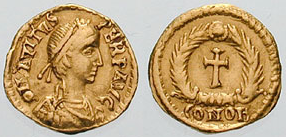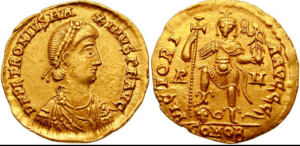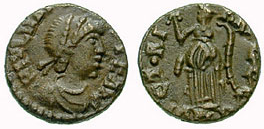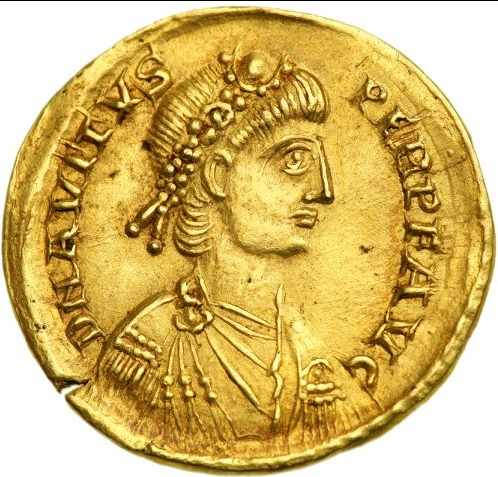
Eparchius Evitus
Date of Birth
Circa 385
Place of Birth
Auvergne, Gaul
Towns / Cities Moved Into
He was active in various parts of the Western Roman Empire, including Gaul and Italy.
Known Occupation
Western Roman Emperor (455-456)
Magister Militum, Praetorian Prefect of Gaul,
Bishop of Piacenza
Religion
-
Spouse
Death Information
Year of death
457
Place of death
On the way to the Alps from Placentia
Cause of death
Assassination
Obituary

Parents

Flavius Eparchius Philagrius

Egnatia Avita Major Severa
Marital Status
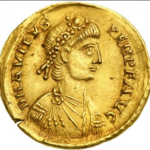

Married Aurelia of Rome Apollinaris
418
Siblings




Children





Narrative / Story
Eparchius Avitus, born circa 385 in the region of Auvergne, Gaul, emerged from a lineage of distinction and nobility. His parents, Flavius Eparchius Philagrius and Egnatia Avita Major Severa, were entrenched in the upper echelons of Gallo-Roman society, providing Avitus with an upbringing steeped in privilege and responsibility. Growing up during the twilight years of the Roman Empire, he was a witness to its gradual decline and the rising influence of barbarian tribes, a backdrop that would profoundly shape his life and career.
Avitus’ journey began with an education in law, a common path for someone of his status. However, the call of a military and political life proved stronger, leading him down a path that would intertwine the art of war with the nuances of diplomacy. By 437, he had ascended to significant roles such as Magister Militum and Praetorian Prefect of Gaul. His heritage played a crucial role in his career, particularly in forging alliances with the Visigoths, a key power during this era.
In the realm of personal life, Avitus’ marriage in 418 to Aurelia of Rome Apollinaris was more than a union of hearts; it was a strategic alliance that further cemented his position within the Roman aristocracy. Together, they had children who would carry on the legacy of their lineage: Saint Hesychius I, Ecdicius Avitus, Papianilla, Agricola, and Alquima. His family life, though often overshadowed by his public duties, was an integral part of his identity, intertwining with the political and military spheres he navigated.
The pinnacle of Avitus’ career was his ascension to the Western Roman Emperor in 455, a role he held until 456. This period was marked by significant achievements, including his pivotal role in the alliance against Attila the Hun alongside Theodoric I and Aetius in 451. However, his reign was not without its challenges. He faced opposition from the Vandals and internal strife, particularly from the Roman Senate, who were uneasy with a Gallo-Roman emperor.
Avitus’ time as emperor coincided with a period of intense socio-economic upheaval. The sack of Rome by the Vandals in 455 and the broader decline of the Western Roman Empire were indicative of the turbulent times. His Gallic background also brought its own set of challenges, as it stirred resentment among certain Roman factions, highlighting the racial and ethnic tensions of the era.
His reign, however, was short-lived. In 456, Avitus was deposed and subsequently appointed Bishop of Piacenza. This role, however, was brief as he faced the ultimate fate of assassination in 457 while attempting to escape to the Alps. His death marked the end of a career that had risen to the highest echelons of Roman power, only to fall in the face of the empire’s relentless decline.
Avitus’ story is a reflection of the complexities and tumultuous nature of his times. His ascent from a noble family in Gaul to the throne of the Roman Empire and his subsequent fall encapsulate the era’s shifting alliances, socio-economic challenges, and the overarching narrative of an empire in decline.
His legacy, however, extends beyond his political and military achievements. It lies in the resilience and adaptability he demonstrated in an era of great change. Avitus navigated the shifting sands of power, ethnicity, and politics in a period that demanded as much skill in diplomacy as in warfare.
In the annals of history, Eparchius Avitus stands as a figure who embodied the virtues and vices of his time. His life story, marked by ambition, alliance, and adversity, offers a window into the late Roman Empire’s complex socio-political landscape. It is a tale of a man who rose to power in a world on the brink of transformation, playing a pivotal role in the events that shaped the course of Western history.
In conclusion, the life of Eparchius Avitus serves as a poignant reminder of the transient nature of power and the enduring impact of leadership during times of crisis. His story, woven into the fabric of a declining empire, continues to resonate as a testament to the human capacity to strive, achieve, and adapt in the face of insurmountable odds.
